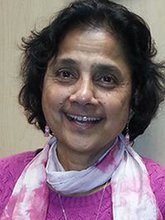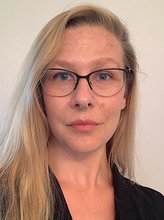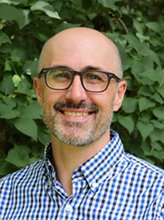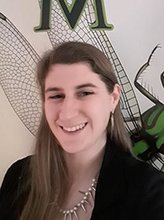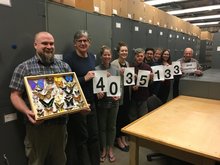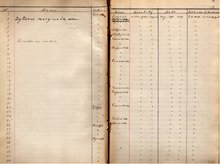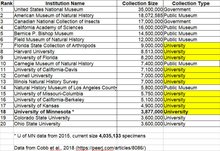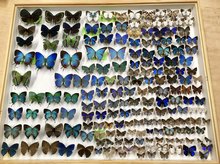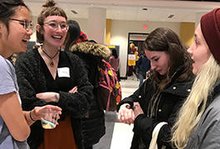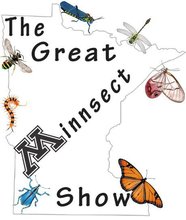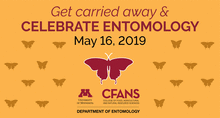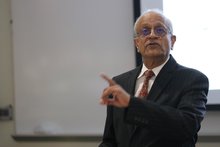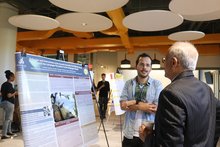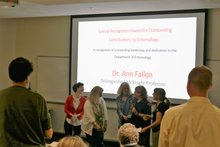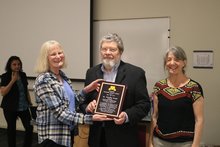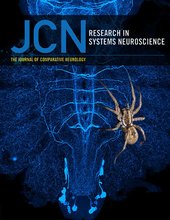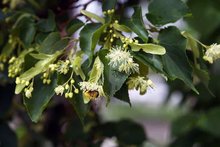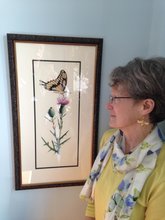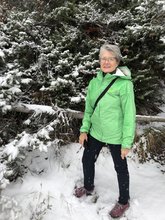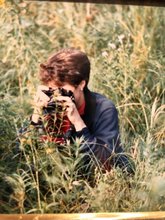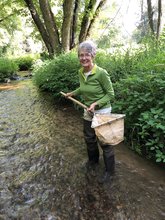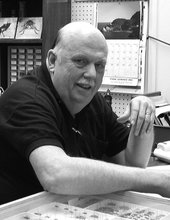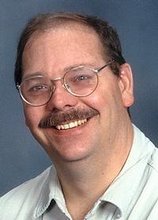Message from Department Head, Sujaya Rao
Greetings! Welcome to our first e-newsletter – a new vehicle for sharing our stories widely!
Two years have already passed since I returned to the UMN Entomology Department! The time has gone by quickly and I have many exciting ‘bites’ to share with you – new members that have joined the department, milestones we have crossed, a plethora of wonderful events that have enhanced the visibility of the department and our discipline, the growing Entomology Minor, the multitude of local and national awards received, and more!
Happy Reading! Send us your thoughts and ideas on this format – we welcome your feedback!
Happy New Year!
Welcoming New Members to the Department
Dr. Amelia Lindsey
Dr. Amelia Lindsey was hired as a tenure-track Functional Genomics Entomology Assistant Professor supported by the AGREETT program. She started her position in July 2020.
Dr. Lindsey received her Ph.D. in Entomology in 2017 from the University of California, Riverside. She is currently a Postdoctoral Researcher at Indiana University since 2017. She is broadly trained in a wide variety of technical and analytical techniques applicable to functional genomics of agricultural pests and beneficial biological control agents (genome sequencing and transcriptome analysis). She investigates mechanisms of insect-symbiont interaction, mainly insect – Wolbachia interactions. She is using her transcriptomic data and genomic analyses to improve biological control strategies in pest management. Her research includes “genomic, molecular, and evolutionary approaches to develop a mechanistic understanding of insects and their symbionts with the goal of improving pest management.” She has experience in the areas of biological control and symbiont-mediated methods of pest control. She organized a symposium called “Synergy in arthropod genomics: Integrative solutions to functional and evolutionary biology” at the 2015 Annual Entomological Society of America Meeting in Minneapolis, MN. Dr. Lindsey was a graduate teaching assistant at UC Riverside and received an Outstanding Teaching Assistant award for her work. She had a concentration in Preparation for Teaching as part of her undergraduate degree, and completed training in Process Guided Inquiry Learning while a graduate student. She has experience mentoring graduate and undergraduate students. As a graduate student, she received many awards, including the John Henry Comstock Ph.D. Student Award from the Entomological Society of America in 2017. As a woman in science, Dr. Lindsey has been active in receiving and providing support from/to other women scientists. She has also been especially engaged in teaching and mentorship of Hispanic and other English-as-a-second-language students, and seeks to use her privilege to support and guide under-represented individuals in their goals related to all aspects of scientific life.
Dr. Matthew Petersen
Dr. Matthew Petersen was hired as a Teaching Assistant Professor for enhancing the undergraduate entomology curriculum at UMN for growing the Entomology Undergraduate Minor. He joined the Department of Entomology in May 2019 and, in just seven months, has gained the reputation of being a passionate, enthusiastic and inspiring teacher! Thanks to his ‘active learning’ approach, and drive to provide students with the best possible educational experience, undergraduates in his Insect Biology course have been motivated to enroll in the Minor, and take additional entomology courses, especially if he teaches them! Matt is continually seeking opportunities for drawing students to entomology – his online offering of Insect Biology in Spring 2020 reached its cap of 80 students almost as soon as students were able to register for it! Matt is pursuing a multitude of other ideas for UMN undergraduate engagement is entomology – stay tuned! Meanwhile, if you would like some teaching tips, contact Matt right away!
Dr. Petersen received his PhD in Entomology and Ecology & Evolutionary Biology for Iowa State University in 2008. He gained additional research experience as a Postdoctoral and a Senior Research Associate at Cornell University and considerable teaching experience as a Visiting Assistant Professor at Roanoke College in VA, and an Adjunct Instructor at Minnesota State University at Mankato and Metropolitan State University in St. Paul.
Hilary Strander
We are fortunate to have Hilary join our team in August as our new Administrative Director. She brought to the position diverse experiences in managing office operations, human resources, and finances. She had eight years of administrative roles at the University of Minnesota so was able to hit the ground running; prior to joining us, she was the Administrative Director at Institute for Translational Research in Children’s Mental Health in CEHD (College of Education + Human Development). Building relationships is key to her success, and is something she considers one of her strengths. She is incredibly excited about working with us. Insects are of considerable interest to her - for her BA degree, she concentrated on ceramic arts, specifically sculpture inspired by insects and other invertebrates!
Recent Landmark Achievements
The Insect Collection achieved a major milestone by surpassing four million specimens!
The University of Minnesota Insect Collection passed a milestone in 2019! It now contains 4,035,133 specimens representing over 53,000 species. These figures make it the 10th largest university-affiliated insect collection in North America and the 18th largest overall of 223 collections tallied in a 2018 survey (https://peerj.com/articles/8086/). For 140 years the collection, located on the St. Paul campus, has served as a treasure-trove of insect diversity. It was started in 1879 from a few thousand specimens collected from the north shore of Lake Superior by C.W Hall. Now, specimens from all over the world are represented, as well as Minnesota and the Midwest. These specimens, representing past and current collecting efforts, serve as records of insect diversity and changes in their distribution and abundance. For example, certain butterflies and skippers, once common in Minnesota’s western prairies but now rare or extirpated, are known to have occurred there because of specimens collected decades ago and preserved in the collection. Similarly, the waxing and waning of pest species has been recorded over time as has the presence or absence of invasive species or those naturally expanding their ranges as temperatures and habitats change. As such, the University of Minnesota Insect Collection is a priceless archive of insect diversity across time and space. As one visitor to the collection said, it is a “temple of biodiversity.”
The entomology minor reached enrollment of more than 20 students!
Over the past year the department has been brainstorming ideas to enhance the undergraduate student experience for those enrolled in the Entomology Minor program. We are happy to announce several changes that will help existing students navigate courses selection and also encourage other students join the minor program.
Starting in Fall 2020, the undergraduate minor program will be known as the Insect Science Minor and contain four areas of concentration for students to choose from. The Conservation & Environmental Assessment concentration will help students develop the skills needed for the identification and management of invasive and native insects in forests, prairies, aquatic systems, and other habitats, and learn how insects are used as biological indicators of ecosystem health. The Medicine and Global Health concentration will help students develop a strong background in the epidemiology of arthropod-vectored diseases of humans and other animals while enhancing marketable skills for careers in veterinary science or public health. The Agriculture and Plant Protection concentration allows students to learn the fundamentals of insect-plant interactions within agricultural and natural environments while developing a strong background in integrated pest management, including pesticide application and biological control strategies. Finally, the Pollinator Ecology concentration will help students develop their understanding of the important role insects play in plant reproduction while learning how to safeguard pollinator populations through knowledge local and landscape practices.
As entomologists, we understand the diversity of research and employment opportunities that exist within the field of entomology. Through these changes, our goal is to make it easier for students to see their path and to be able to incorporate the study of insects into their future plans.
A community is being built for undergraduates with a passion for insects through an undergraduate club, and their integration in department events such as the Fall welcome.
New Events
The Great Minnsect Show
The first annual Great Minnsect Show was launched in April 2019. This community event, a partnership between the department, the graduate club Frenatae, state, federal and industry agencies, showcased insects and their associations with humans. It was held on Thursday April 25th on the East Bank Campus for the UMN community and on Saturday April 27 on the St Paul campus for families. The event included a career fair, insect petting zoo, an opportunity to taste insect-based snacks.
"We LOVED the insect program at the U today. My grandson and my friend's kids had a wonderful time! It was very well done. Lots of multi-age activities, staff that were very good with children. I want to attend every year. It was a huge success for the five kids we brought. Thank you so much!"
-Comment from a parent
Stay tuned for details about the 2020 Spring event!
Celebrate Entomology
Celebrate Entomology – new in 2019 – featured the Richards-Hodson Endowed lecture, sponsored by Dr. Sping Lin, which was presented by Dr. Sonny Ramaswamy, President of Northwest Commission on Colleges and Universities, WA , and former Director, USDA NIFA, DC. Sonny’s thought-provoking talk ‘Of Bugs, Entomology, and Global Food Security’, ended with a live preparation of avocado salsa with mealworms for the audience to taste!
The event included a poster session where graduate students shared their research, the Hodson Alumnus talk, and presentation of department awards to graduates, undergraduates, faculty and staff Listed under 2019 Achievements.
The Hodson Alumnus Award, named in honor of Dr. Alexander Hodson, Department Head from 1960-1974, recognizes and honors an outstanding graduate alumna or alumnus of the Department of Entomology. Prof. Tim Kurtti, Department of Entomology, University of Minnesota was selected for the 2019 Hodson Alumnus Award.
Select News Spotlights
On the cover: Journal of Comparative Neurology
Graduate student Anthony Auletta’s research conducted in Dr. Karen Mesce’s lab was featured on cover of the Journal of Comparative Neurology.
Auletta, A., Rues, M. C. P., Harley, C. M., Mesce, K. A. 2019. Tyrosine hydroxylase immunolabeling reveals the distribution of catecholaminergic neurons in the central nervous systems of the spiders Hogna lenta (Araneae: Lycosidae) and Phidippus regius (Araneae: Salticidae). DOI: 10.1002/cne.24748
Seeking a Culprit When Bumblebee Carcasses Pile Up
Dr. Sujaya Rao’s research was featured in the New York Times: Seeking a Culprit When Bumblebee Carcasses Pile Up
UMN Department of Entomology 2018–2020 Achievements & Honors & Graduations
2018–2019
Congratulations to UMN entomology undergraduates, graduates, staff and faculty for their selection for fellowships, awards, student competition prizes, and other honors and achievements, at UMN, nationally, and internationally!
Faculty Promotion
Dr. Robert Koch was promoted from Assistant Professor to Associate Professor
Fellowships
UMN
- Doctoral Dissertation Fellowship
Anthony Auletta - Moos Graduate Research Fellowship in Aquatic Biology
Corrie Nyquist
CFANS
- MnDRIVE Global Food Ventures Graduate Student Professional Development Program
Hannah Gray
Maggie Shanahan
Entomology Department
- Excellence in Entomology
Eric Middleton
Patrick Pennarola - MGK Fellowship
Dominique Ebbenga - Lugger-Radcliffe Fellowship
Daniela Pezzini - Morris and Elaine Soffer-Rockstein Fellowship
Samuel Ward & Hannah Gray - Marion Brooks-Wallace Fellowship
Anh Tran - Dr. Allan G. Peterson Fellowship
James Wolfin
Awards
National
Entomological Society of America
- Larry Larson Graduate Student Award for Leadership in Applied Entomology
Daniela Pezzini - P-IE Master’s Student Achievement in Entomology Award
Michelle Boone - P-IE Undergraduate Student Achievement in Entomology Award
James Menger - P-IE Recognition Award in Entomology
Bill Hutchinson - P-IE Integrated Pest Management Team Award
Bob Koch
Ian MacRae
Bruce Potter
Phillip Glogoza - ESA Science Policy Fellow
Julia Brokaw
Grad 10-min Oral Presentation
- P-IE Section, Pollinators, 2nd Place
Michelle Boone - P-IE Section, Spotted-wing drosophila, 2nd Place
Anh Tran
Grad Poster
- MUVE Section, 1st Place
Cody Thorpe - P-IE Section, 1st Place
Rafael Carlesso Aita - PBT Section, 2nd Place
Anthony Auletta - SysEB Section, 2nd Place
Julia Leone
UMN
-
2018 Presidents Outstanding Community Service Award
Becky Masterman
CFANS College Assembly Awards
- Pioneering and Innovation Award
Kiley Friedrich
CFANS Bell Museum Awards
- National History Award (McKinney)
Corrie Nyquist
Department Awards presented during 2018 Alumni & Graduate Student Recognition Event
- Hodson Graduate Alumni Award
Chris DiFonzo - Faculty Award for Mentorship in Entomology
Tim Kurtti - Department of Entomology Exemplary Service Award
Tim Kurtti - Department of Entomology Community Service Award
Anthony Auletta - Robert C. Hodson Memorial Undergraduate Scholarship
Traci Eicholz
Graduations 2017–2018
- M.S.
Daniela Pezzini
Grace Sward
- Ph.D.
Theresa Cira
Anthony Hanson
Andrea Hefty
Petra Kranzfelder
Trisha Leaf
Yang "Grace" Li
Samuel Ward
2019–2020
Congratulations to UMN entomology undergraduates, graduates, staff and faculty for their selection for fellowships, awards, student competition prizes, and other honors and achievements, at UMN, nationally, and internationally!
Faculty Promotion
Dr. Stephen A. Kells was promoted from Associate Professor to the rank of Professor.
Fellowships
National
- NSF Graduate Fellowship
Michelle Boone
Maggie Shanahan - Pathfinder Fellowship Consortium of Universities for the Advancement of Hydrologic Science, Inc.
Corrie Nyquist
UMN
- Doctoral Dissertation Fellowship
Morgan Carr Markell
Eric Middleton - Interdisciplinary Center for Global Change (ICGC) Global Food Security Fellowship
Maggie Shanahan
CFANS
- Hueg Harrison
James Miksanek - MnDRIVE Global Food Ventures Graduate Student Professional Development Program
Eric Middleton
Anh Tran
CFANS Bell Museum Fellowships
- Natural History Fellowship (Simons Fund)
Eric Middleton
Entomology Department
- Excellence in Entomology
Ismael Ramirez Moreno - MGK Fellowship
Correy S. Hildebrand - Lugger-Radcliffe Fellowship
Obiratanea da S. Queiroz - Morris and Elaine Soffer-Rockstein Fellowship
Edwin Benkert - Marion Brooks-Wallace Fellowship
Ernesto Rázuri-Gonzales - Dr. Allan G. Peterson Fellowship
Correy S. Hildebrand
Awards
National
- Fellow of the Entomological Society of America
David Andow - NCB Award of Excellence in Integrated Pest Management
Robert Koch
Grad 10-min Oral Presentation
- P-IE Section, Biocontrol, 1st Place
Eric Middleton - P-IE Section, Forest, 2nd Place
Dora Mwangola - P-IE Section, Field Crops 5, 1st Place
Dominique Ebbenga - P-IE Section, Pollinator 2, 1st Place
Michelle Boone
Undergraduate Poster
- P-IE Section, 1st Place
Izzy Bur
UMN
- 2019 Outstanding Community Service Award
Elaine Evans - 2019 Mary A McEvoy Public Engagement and Leadership Award
Julia Brokaw - President’s Student Leadership and Service Award
Julia Brokaw
CFANS College Assembly Awards
- Graduate Assistant Teaching Award
Anthony Auletta - Distinguished Academic Staff Award" (P/A category)
Eric Burkness - Civil Service/Bargaining Unit Staff Award in the Technical category
Christina Herron-Sweet - Distinguished Diversity and Inclusion Award
Dan Cariveau - Distinguished Extension/Outreach Award
Jeff Hahn
CFANS Borealis Night of Excellence Awards
- Graduate Student Leadership Award
Anh Tran - Exemplary Graduate Student Organization Award
Frenatae - Exemplary Post-Doc Award
Erin Treiber
CFANS Bell Museum Awards
- National History Award (Dayton Fund)
Julia Brokaw
Department Awards presented during Celebrate Entomology 2019
- Hodson Graduate Alumni Award
Tim Kurtti - Special Recognition Award for Outstanding Contributions to Entomology
Ann Fallon - Faculty Award for Mentorship in Entomology
Ralph Holzenthal - Department of Entomology Community Service Award
Jeff Hahn - Department of Entomology Service Award
Tammi Pekkala Matthews - Robert C. Hodson Memorial Undergraduate Scholarship
Izzy Burr
Damon Leach
State of Minnesota
- 2019 Minnesota Pollinator Hero Award: for outstanding pollinator conservation and advocacy & 2019 Community Leadership Award: WCWD for excellence, sustainability, cooperation in community conservation practices
Laurie Schneider
International Faculty Honor
Dr. Karen Mesce was voted as President-elect of the International Society for Neuroethology (https://www.neuroethology.org/).
Graduations 2018–2019
- M.S.
Dominique Ebbenga
Marie Hallinen
Correy Hildebrand
Ismael Ramirez Moreno
Patrick Pennarola
Obiratanea da Silva Queiroz
Hailey Shanovich
Jake Wittman
James Wolfin
- Ph.D.
Anthony Auletta
Katie Lee
Zach Marston
New M.S. Students
Rosa "Tina" Lozano
James Menger
Adam Toninato
Henrique Vieria
New Ph.D. Students
Dominique Ebbenga
Correy Hildebrand
Ismael Ramirez Moreno
Jake Wittman
Engaging Alumni
Alumni Spotlight: Margot Monson
Margot Monson received her BS in physical therapy, and later, following a life long interest in insects, received her MS from the Dept of Entomology in 1994. She and her advisor, Ralph Holzenthal, shared an interest in Trichoptera. After graduating, she taught the insect taxonomy course while Ralph was on sabbatical in Brazil. She also taught aquatic entomology at the U of M Itasca Biological Station. She has been an avid promoter of our discipline at every opportunity that comes her way. Her early postgraduate work centered on using aquatic insects as bioindicators of water quality in the Long Prairie River watershed. She also worked on contracts with the MN DNR and the Minnesota Pollution Control Agency on streams and wetlands containing interesting caddisflies.
Over the years she has been involved in using live insects at the MN State Fair, from working with John Luhman for the Dept of Ag displays, to the honey bee exhibit in the Dept of Horticulture, various Water Day festivals on the State Fairgrounds and at Lake Phalen, and the Bell Live program at the original Bell Museum.
As she became known locally as an entomologist in her St Anthony Park neighborhood, it led to numerous opportunities for educating children and adults, from teaching them about rearing insects for science projects, to educating teachers about the common insects in their environments that they could use in their science curriculum, to bringing live aquatic insects into classrooms in several elementary and middle schools, instructing teachers and children about insects in urban and rural landscapes, including on an organic farm, working with 4 H clubs, scout troops, garden clubs, and church and community educational forums. She believes that teaching about the insects found in our own local environments, is important in appreciating their amazing diversity, and critical to understanding of their roles in environmental integrity.
Originally while visiting her own children's classrooms, she began to receive calls from other teachers and often worked as a volunteer in different schools. Since entomology is rarely taught in public schools, she felt strongly about teaching children at the elementary and middle school levels to capture the curiosity and enthusiasm so apparent in youth when they can be up close and hands-on with live insects.
Much of her work in the last several years has been as a volunteer working in classrooms and teaching summer camps in the new Bell Museum. Becoming a beekeeper 10 years ago, led to bringing honey bees and native pollinators into classrooms. She has testified many times at the MN legislature in advocating for bills that draw attention to the pervasive use of chemicals that end up in our soil and water supply, contributing to their degradation, and impacting both our aquatic insect fauna and our pollinators. In 2018-19 she met with legislators asking for their support for bills that provide for the establishment of more natural habitats along roadways and open spaces normally mowed, for funding for adding native and other flowering plants in urban and rural landscapes, and argued for passage of the Lawns to Legumes bill, providing funds for establishing bee lawns (research by our own James Wolfin).
Given population growth and agricultural land use that often works in opposition to healthy soil and water conservation, her interest in insects as valuable protein for human consumption, from land conservation and economic perspectives, has led to an interest in entomophagy. Many other cultures consume insects on a regular basis, so she has been experimenting with insects in recipes and trying them out on occasion in the Dept. Margot's life long curiosity about insects expanded greatly under Ralph's mentorship, and her fascination with insects and their diversity just continues . . .
Alumni, get involved! The UMN Alumni Association recently developed and funded the Maroon and Gold Network, a free, online platform for career-related advice and networking that has grown to more than 5,000 alumni and students in 44 countries and 46 states plus Washington DC!
Join The Maroon & Gold Network today!
In Memoriam
Dr. Phillip Clausen
Dr. Phillip J. Clausen, former Curator of the University of Minnesota Insect Collection, passed away in December, 2018. He was 81. Phil was curator for nearly 40 years, from 1971 until he retired in 2010. The current structure, diversity, and quality of the collection is largely due to Phil’s dedicated care. He was also instrumental in establishing the collection’s accession database in the early 1970s, that is still in use today. Phil received his undergraduate degree in Forestry from the U of M and both his MS and PhD degrees in our department in 1965 and 1969, respectively. His advisor, Dr. Ed Cook, my predecessor, was an expert in Diptera and Phil worked on Ephydridae, shore flies, for his graduate and professional research. He also had a very strong interest in Cerambycidae; as a result, the collection has very diverse holdings in both of these groups. For much of his career, Phil took numerous collecting trips around the world to obtain material for the collection, adding to its species diversity, especially noticeable in butterflies and moths. He was also very skilled in building and repairing museum supplies, all types of curatorial techniques, and broadly knowledgeable in insect identification. He loved working in the collection, laughing at and complaining about poorly written identification keys, making up funny names for insect taxa, or commenting on the University’s administrative foibles. What most people remember about Phil is his entertaining and informative tours of the insect collection, his visits to local schools, and his annual presence at the State Fair to delight people about the wonders of insects and the importance of entomology. He could coax the most entomophobic child or parent to pet a tarantula or hold an emperor scorpion. It was a great pleasure to have worked with him for almost 25 years. HIs wife, Lynette, and 2 sons live in St. Paul. He has 5 grandchildren. Phil wanted no public memorial service. It is nice to just remember him and to see his professional contribution to the Department and University everyday in the Insect Collection.
Dr. Sping Lin
Honoring and remembering Dr. Sping Lin, a generous donor to the Department of
Entomology
Dr. Sping Lin, a generous donor to the Department of Entomology, passed away on May 21, 2019 at the age of 100 years. A native of China, Sping traveled to UMN after receiving an undergraduate degree in entomology. Here, he received his M.S. and Ph.D. degrees in the Department of Entomology, in 1950 and 1952, respectively. Subsequently, he joined the faculty in the Department of Neurology where he conducted research on brain chemistry until his retirement in 1986. Dr. Sping Lin and his wife Ying-Ngoh Deng were avid supporters of our department over many years. In 2000, their donation established the Sping and Ying-ngoh Lin Fellowship for graduate students. In 2011, following the passing of his wife, Sping made another significant gift to the department in her honor and that of his advisors, Dr. Alex Hodson and Dr. Glen Richards. This gift established the “Richards-Hodson Lectureship in Insect Physiology and Ecology. In 2018, soon after he met Sujaya Rao and heard about her vision for the future of the department, Dr. Lin provided another gift for establishment of the “Sping and Ying N. Lin Fund for Teaching and Outreach in Entomology”. This gift was instrumental in supporting many of the new efforts listed above including the hire of a new Teaching Assistant Professor, interesting new courses designed to attract undergraduates to Insect Science, and new outreach events for enhanced awareness about the importance and significance of the discipline of entomology! We celebrated Dr. Sping Lin’s 100th birthday last fall. His sense of humor and joy in “making it to 100 years” was a joy to behold!
http://www.startribune.com/obituaries/detail/0000311586/
Dr. Allan Peterson
Honoring and Remembering Dr. Allan Peterson, dynamic teacher in the Department of Entomology
Dr. Allan G. Peterson, a dynamic teacher in the Department of Entomology, passed away on March 2, 2019, just six weeks shy of his 104th birthday. Dr. Peterson completed his PhD in the Department of Entomology and was subsequently hired as a tenure-track assistant professor. An engaging lecturer and conversationalist, Allan was a popular professor, starting each class with a poem, many of which he wrote himself. In addition to writing poetry, after WWII Allan began typing weekly letters to family members. The final total of numbered letters was more than 2,000. He retired from the department in 1979 and led an active life in rural Aitken. He moved up to Crookston in 2007 to be with his family (his son, Bill, was a mathematics professor at the Crookston campus). He had an omni-present smile and a seemingly never-ending supply of chocolates and candy that he doled out generously. He loved to bake cookies, and at the Graduate Student Alumni Award celebration, the recipient of the Allan G. Peterson Award would be presented with a box of home-made cookies in person, while Allan could still drive from his home in Aitkin (around age 92).
http://www.crookstontimes.com/obituaries/20180305/obituary---allan-georg...
Dr. Steve Seybold
Steven Jon Seybold, beloved son of Robert and Patricia Seybold passed away suddenly from a heart condition on Friday, Nov. 15, 2019, at Sacramento Sutter Hospital. Steven was born on Oct. 14, 1959, in Madison, WI, and was raised in Madison. He was a 1977 graduate of Madison Memorial High School. Before he graduated from the University of Wisconsin-Madison with a B.S. degree in Forestry, he studied a year at the University of Freiburg, Germany, where his future focus of combining science with forestry became his career path. For graduate school, Steven enrolled at University of California-Berkeley, receiving a Ph.D. in Forest Entomology specializing in the pine bark beetle. Dr. Seybold completed postdoctoral work at the University of Nevada-Reno and was on the faculty of the University of Minnesota-St. Paul for several years before returning to California. Dr. Seybold was a Research Entomologist with emphasis on chemical ecology of forest insects for the USDA Forest Service, Pacific Southwest Research Station and was a lecturer at the University of California-Davis. He was a member of Phi Beta Kappa and Phi Kappa Phi honor societies. He was a collector by nature, collecting and categorizing all he found beginning with butterflies before he was four to rocks, coins, and stamps. He loved the outdoors and loved sharing it with his daughters. Over those years, beside being a scholar, he was an accomplished musician, excelling on clarinet.
Support Us
Your support will help us achieve our mission of providing world-leading research and education that inspires society to value the environmental contributions of insects and their relatives, and to use best management practices to protect our food, health, and environment. Donate here
Thank you to the donors who helped us raise $9,635 on Give to the Max Day on November 14 for the Pollinator Bank. Your support is helping us build a repository and database of Minnesota bees within the Department of Entomology’s Insect Collection.


